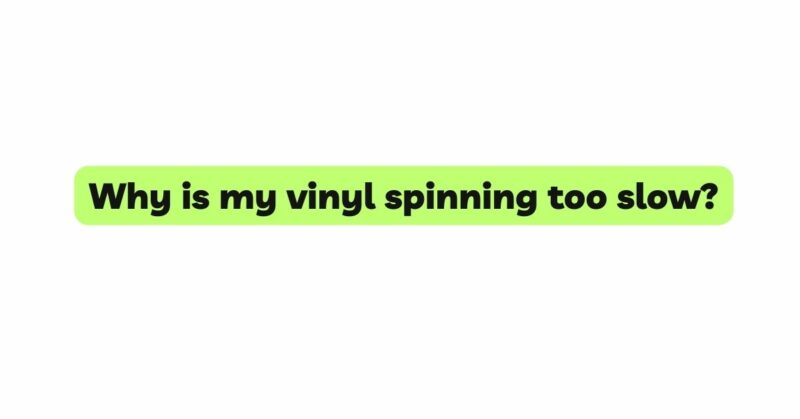Vinyl records have experienced a resurgence in popularity over the past decade, appealing to audiophiles and music enthusiasts alike. However, one of the most common frustrations for vinyl lovers is encountering issues with their turntable’s speed. A vinyl spinning too slowly can result in distorted sound, pitch fluctuations, and an overall unsatisfactory listening experience. In this article, we will delve into the possible reasons behind this problem and explore effective troubleshooting steps to get your turntable back in perfect working condition.
- Belt Drive Turntables
A significant number of turntables on the market employ a belt drive system. This mechanism employs a rubber belt connecting the turntable’s motor to its platter. Over time, these belts can wear out, lose elasticity, or become misaligned, leading to slower-than-normal rotation.
Solution: Check the belt’s condition and replace it if necessary. You can refer to your turntable’s user manual or seek professional assistance to ensure proper replacement.
- Direct Drive Turntables
Direct drive turntables, on the other hand, have a motor directly connected to the platter, making them less susceptible to belt-related issues. However, other factors can still cause a slowdown in rotation speed.
a. Motor Issues
Direct drive turntables rely on a functioning motor to maintain a consistent and accurate speed. If the motor’s performance declines due to wear and tear or electrical issues, the turntable’s speed can suffer.
Solution: Contact a qualified technician to inspect the motor and make necessary repairs or replacements.
b. Power Supply Problems
Fluctuations in the power supply can negatively impact the turntable’s motor, causing it to rotate at an incorrect speed. Voltage inconsistencies, faulty power cables, or issues with the outlet can contribute to this problem.
Solution: Use a stable power source or invest in a power conditioner to regulate the voltage and minimize electrical interference.
- Incorrect Pitch Control Calibration
Many modern turntables come equipped with pitch control, allowing users to adjust the rotation speed slightly. If the pitch control is misaligned or set to an incorrect position, it can lead to unintended speed variations.
Solution: Consult your turntable’s manual for instructions on calibrating the pitch control properly. Ensure it is set to the default position if you’re not adjusting the speed intentionally.
- Platter Bearing and Lubrication
The platter bearing plays a crucial role in maintaining the smooth rotation of the turntable. A lack of proper lubrication or the presence of debris can lead to increased friction and slow down the platter’s movement.
Solution: Clean the platter bearing and apply appropriate lubrication according to the manufacturer’s recommendations.
- Warped or Uneven Vinyl Records
Sometimes, the issue might not lie with the turntable itself but with the vinyl record being played. Warped or uneven records can create inconsistencies in rotation speed, resulting in audio distortion.
Solution: Inspect your vinyl records for visible warping or damage. Use a vinyl flattening device or seek professional help to correct the warping if possible.
- Turntable Calibration
A poorly calibrated turntable can also cause speed irregularities. Incorrect settings, such as the wrong RPM selection, can make the turntable spin too slow or too fast.
Solution: Refer to your turntable’s manual to recalibrate it properly, ensuring that all settings are accurate.
Conclusion
A vinyl spinning too slow can be a frustrating experience for any vinyl enthusiast. However, with a systematic approach to troubleshooting, it is possible to identify and resolve the underlying issues. Whether the problem lies with the belt, motor, power supply, pitch control, platter bearing, or vinyl records themselves, taking the time to diagnose and address the root cause will ultimately restore your turntable to its optimal performance. Remember, if you’re uncertain or uncomfortable with DIY fixes, seek the assistance of a professional technician to ensure the longevity and enjoyment of your vinyl collection.


